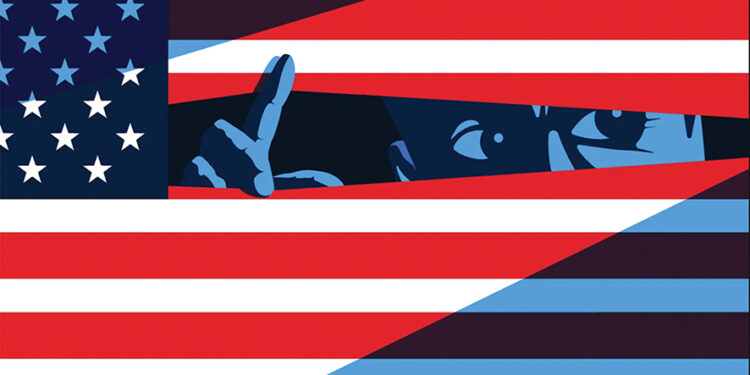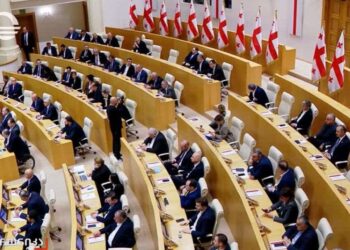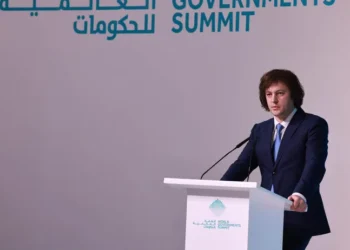One peculiarity of contemporary liberalism is that, despite its claims to embrace pluralism, free speech, and tolerance, it frequently adopts a rigid stance toward conservative viewpoints. Many liberal organizations and academic societies have resorted to censorship, moral judgment, and outright rejection of opposing viewpoints rather than engaging in dialogue. As a result, right-wing groups have become more radical as conservatives, particularly working-class voters and traditionalists, have ended up being distanced from the political mainstream.
One notable aspect of leftist intolerance is the incorrect application of historical analogies, particularly the labeling of conservative and right-wing viewpoints as “fascist” or “far-right.” While extreme groups undoubtedly possess these characteristics, conservative parties and individuals in general have been unfairly lumped together with them.
During the late Cold War era, people who disagreed with moderate conservative leaders, such as Margaret Thatcher, the prime minister of the United Kingdom from 1979 to 1990, and Ronald Reagan in the United States, frequently labeled them dictatorial or even “fascist.” Political rivals and left-leaning news organizations gave them a lot of negative publicity. Because of her actions, such as limiting trade unions and implementing free-market reforms, Thatcher was accused of being a tyrant. Despite these claims, her administration backed democratic procedures and institutions. Similarly, the US Ronald Reagan faced criticism for his aggressive foreign policy and economic reforms. Those who disapproved of his policies labeled him “fascist,” particularly in regards to military actions and backing particular foreign regimes. However, these labels were not accurate depictions of his rule and were primarily employed as insults. The Reagan administration strongly complied with the American Constitution. His actions sparked controversy, but they did not undermine democratic institutions.
Similarly, French president Jacques Chirac was frequently criticized for his stringent immigration laws and national identity beliefs, which were viewed as being overly conservative, despite his support for social welfare initiatives and European unification. During his tenure as Prime Minister of Australia from 1996 to 2007, John Howard fought against progressive social developments and imposed stringent immigration restrictions, which led to accusations of authoritarianism. Nevertheless, a democratic mandate gave his initiatives a lot of support, indicating that the electorate supported them. Thus, it has become more difficult to see the clear picture due to political hyperbole, media prejudice, and social media restrictions.
According to Jonathan Haidt, a social psychologist at NYU, intellectual environments that are overly closed off might result in “bubble effects,” which make it more difficult for leftists to comprehend or relate to conservative viewpoints. In his 2018 book, The Coddling of the American Mind, co-authored with Greg Lukianoff, Haidt claims that democratic discourse has been harmed by the emergence of “safetyism” – the idea that society should be protected against certain dangerous or harmful ideas. According to him, schools have actually made it more difficult for children to think critically about opposing viewpoints rather than protecting them, by excluding them from views they disagree with.
Voters’ disengagement from complex political discourse can be observed in two primary ways. Right-wing views have not been eliminated by suppressing conservative ideas through political discussion, biased media, or social censure; rather, it has driven them to more solitary locations where they frequently become more radical. A growing number of conservative-leaning voters believe that the only viable political options are leaders like Trump in the US, Orbán in Hungary, and the AfD in Germany, and feel cut off from liberal news. In this context, people frequently make political decisions not because they genuinely care about democracy and government, but because they dislike their alleged ideological rivals. This involves both conservatives and leftists. Ignoring opposing viewpoints prevents real discussion and promotes ideological solidarity among liberals.
Conservatives dissatisfied with mainstream politics, on the other hand, started supporting populist leaders rather than promoting thoughtful political discourse. Because of the negative feedback loop that is produced, there is consequently less space for free expression or consensus. Both ideological factions solidify their positions even further. People who are unwilling to cooperate across party lines are a problem for democracies. Maintaining democratic institutions in a world when gaps are widening requires reviving a culture of open dialogue and understanding.
The theory of “Deep State” and the Conservative Attack on Democracy
Numerous conspiracy theories, including the “Deep State” theory, were able to flourish as a result of the aforementioned communication breakdown between the two ideological parties. The idea that a strong, entrenched, and unelected bureaucratic elite dominates the backroom and threatens democracy in government first surfaced in Western politics as a conspiracy theory. Although the theory originates from the Turkish political context of the 1920s, it gained popularity in the United States through right-wing populist rhetoric during Trump’s first term, 2016-2020.
The “Deep State” narrative has been utilized by individuals such as Steve Bannon and Donald Trump to justify delegitimizing opposition, dismantling regulatory agencies, and conducting political purges. The conservative establishment has become an authoritarian force in its attempt to “drain the swamp,” dismantling democratic checks and balances and handing over authority to unaccountable individuals like Elon Musk. Elon Musk’s alleged Department of Government Efficiency (DOGE) is one of the most obvious examples of this tendency. Despite being marketed as a necessary attempt to reduce bureaucracy, Musk’s nomination as a private citizen with no prior government experience is indicative of a larger issue: the privatization of government and the lack of political supervision. Ironically, the conservative elite’s strategy for opposing the so-called “Deep State” is modeled after the very powerful institutions they claim to oppose. They establish their own “deep state” by prioritizing unelected tech tycoons and business executives over elected authorities and institutional structures. The characteristics of this “deep state” include crony capitalism, corporate dominance, and a lack of public accountability. This reform does not eliminate bureaucratic waste; rather, it gives wealthy individuals who back the conservative establishment more influence.
Putting Musk and other unelected officials in charge of government transformation is a real attempt by the conservative elite to undermine democratic values. Musk’s previous actions, such as purchasing Twitter (now X), endorsing right-wing politicians, and becoming actively involved in politics, demonstrate how global companies are increasingly attempting to alter political narratives without following the democratic process.
The conservative elite in the US is increasingly reducing democratic institutions to issues rather than significant governmental components. Strangely enough, though, as conservatives work to overthrow the “Deep State,” they also establish their own version of it, with corporate elites in charge rather than elected representatives. Many people will be impacted by this shift.
The current rise of the right-wing populist organizations in the West aims to subvert democratic governance in favor of a corporately supported authoritarianism. Right-wing populists use the claim that government institutions are corrupt and ineffectual as an excuse for dismantling them. The democratic checks and balances are weakened as a result. As unelected business leaders increasingly influence public policy, the role of elected authorities is being undermined. This is establishing a system in which companies set national goals. In their quest for power under the guise of opposing the “Deep State,” conservatives’ authoritarian inclinations become more pronounced. This movement has the potential to enhance the exact conspiracies it purports to oppose by transforming democratic institutions into tools for elite control over the populace.
Georgia’s utilization of Western ideological conflicts
Georgia’s ruling party, Georgian Dream, has an opportunity to gain more power on a national level as a result of this ideological conflict in the West between liberal democracy and the rise of conservative authoritarianism. The administration has positioned itself as a defender of traditional values and a champion of Georgian national security by adopting the same rhetoric as right-wing populist movements in the West, while simultaneously restricting democratic rights. This tactic gives the ruling party more authority, while eliminating opposition under the pretext of defending its independence from external forces.
Using narratives akin to those of Donald Trump in the US and Viktor Orbán in Hungary is a key component of Georgian Dream’s strategy. The administration views itself as the final bastion of Georgian conservatism and believes that Western democracy is becoming increasingly authoritarian and intolerant. This position aids the party in undermining the legitimacy of its civil society members and political rivals by depicting them as foreign agents.
The “Deep State” theory, or the so-called Global War Party, has also been used as a political weapon by the Georgian Dream government. By promoting the notion that independent media, other parties, and NGOs are all involved in a Western-led conspiracy to undermine state stability and somehow involve Georgia in the ongoing Russian-Ukrainian war, Georgian Dream has increased its hold of power.
Although Georgian Dream bases its political strategy on the rising right-wing ideology in the West, it is not attempting to emulate Western conservative models. Rather, it is utilizing this ideological shift as a pretext to impose an authoritarian regime similar to those in Belarus, Russia, and Azerbaijan, which include suppressing the opposition, limiting civil society, and undermining democratic institutions.
In contrast, Western right-wing populist politicians at least to some extent continue to operate inside democratic structures. By intentionally doing this, the ruling party of Georgia can create a government structure that closely resembles the authoritarian governments it claims to oppose, while also appearing to be a member of the global conservative movement.
Using this type of ideological rhetoric to appeal to the conservative electorate, the government has implemented policies that restrict political liberties. Based on comparable legislation in Russia, the so-called “Russian Law,” passed in 2024, requires NGOs that receive funding from sources outside of Georgia to register as “foreign agents.” This has made it much more difficult for people to discuss politics, since the government has been able to restrict independent journalism and civil society organizations.
The violent dispersal of protests which began in early 2024 demonstrates a broader attempt to stifle opposition under the pretext of maintaining national stability. Things deteriorated after the October 26 elections, as Georgian Dream stepped up in its effort to threaten opposition organizations and NGOs. The administration has stated unequivocally that it intends to use the 2024 law to disband major opposition parties and hinder the operations of independent media.
With closer political and economic links to Baku’s dictatorial leadership, the Georgian Dream administration is moving closer to the Azerbaijani political model. Although the Georgian government hasn’t made any explicitly pro-Russian statements, Moscow benefits from its anti-Western position, since it lessens Western influence in the South Caucasus. This alteration was noticed by Russia when Irakli Kobakhidze, Prime Minister of Georgia, declared on November 28, 2024, that the cabinet had chosen to suspend negotiations with the EU until 2028. Within an hour after this statement, Russian President Vladimir Putin praised Georgian officials directly for their “pragmatic and independent” foreign political approach. This widespread backing was an unmistakable indication that Moscow believes Georgian Dream’s principles align with its own objectives. Although the Georgian government claims that its objectives are unrelated to those of Russia, the increasing praise for Georgian Dream’s programs by Russian officials indicates that Russia views them as beneficial to its overall foreign policy.
As time goes by, Georgia’s future is becoming less clear. The administration may worsen domestic conditions if it continues to restrict political liberties. The 2024 violent crackdowns were met with strong opposition, particularly from Georgia’s youth and civil society organizations. Large-scale protests could result from more severe measures, further destabilizing the political environment. The West may increase economic sanctions on Georgia and cut it off from crucial security and economic links if it continues its shift towards authoritarian governance. At a time when regional security is already precarious, further isolation would leave the nation more vulnerable to Russian influence.
2025 will be crucial in determining whether Georgia continues down this authoritarian path or if external and internal factors drive a shift. The administration has so far benefited from its strategy of exploiting ideological divisions in the West in terms of maintaining political power, but it is unclear what the long-term consequences of this power abuse will bring to GeorgiaIf the country persists in its authoritarian direction, it will mark a major shift away from its historical political commitment to democratic ideals, making it unlikely that these aspirations will be fully restored in the near future.
Blog by Kakhaber Kalichava
Kakhaber Kalichava has a Ph.D in Modern and Contemporary History and lectures at the Ivane Javakhishvili Tbilisi State University














